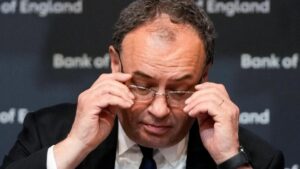
UK interest rates could rise to 3 per cent by the end of the year, financial markets believe, as the Bank of England has to ramp up its measures to fight inflation.
Money markets are forecasting a much tighter UK monetary policy after the Bank upgraded its inflation forecast to peak at more than 11 per cent this year on the back of higher energy prices.
Investors are now pricing in, on average, an interest rate of 3.1 per cent by the end of the year, which would be the highest since 2008. The current rate is 1.25 per cent, set yesterday by the Bank’s nine-strong monetary policy committee. The fifth consecutive rise of 25 basis points defied growing market expectations that the MPC would be forced into a bigger 50 basis point move to keep a lid on inflation, now at a 40-year high.
UK consumer prices hit 9 per cent last month and are on course to peak in excess of 11 per cent in October, according to the Bank, as it lifted a previous projection of 10.2 per cent made in May. The Bank also slashed its growth expectations for the second quarter, predicting a contraction of 0.3 per cent.
Rate-setters also appeared to open the door for faster monetary policy tightening, saying they stood ready to “act forcefully” if inflationary pressures prove more stubborn than expected.
The pound rose by 0.5 per cent yesterday against the dollar, to $1.22, and UK 10-year gilt yields, which move inversely to prices, inched up on the expectation of higher interest rates. The FTSE 100 fell nearly 3 per cent, reflecting fears of a UK economic slowdown.
Market rate expectations help guide projections of inflation and economic growth. Before yesterday’s MPC decision, investors were pricing in interest rates of 2.7 per cent by the end of the year. The increase suggests investors think the Bank will be forced to raise further and faster to keep a lid on prices.
Three MPC members voted in favour of a 50 basis point rise but the Bank did not follow the example of the Federal Reserve, which has accelerated its rate rises in the face of the highest US inflation since 1982. The Fed unleashed a 75 basis point rise on Wednesday, the biggest since 1994, and signalled that further big rises were to come.
Karen Ward, chief market strategist at JP Morgan Asset Management, said UK rate-setters were at risk of having to make further moves. “The Bank had to send a clear message to other pricesetters in the economy that 10 per cent price hikes are not an acceptable new normal,” Ward said. “A 50 basis point hike would more appropriately have sent that signal. It’s possible that by acting cautiously today, it may have to deliver more further down the line.”
However, Martin Beck, chief economic advisor to the EY Item Club, said the Bank was unlikely to raise as fast as markets expect given the sharp slowdown in growth forecast for this year. “It looks very unlikely the rate will get close to the level that market pricing implies for the end of 2022,” Beck said.
Samuel Tombs, chief UK economist at Pantheon Macroeconomics, forecast that UK rates would peak at 1.75 per cent this year. “We doubt a wage-price spiral will emerge now the labour market has stopped tightening,” he said.
Read more:
Bank of England interest rate ‘on course to reach 3%’





